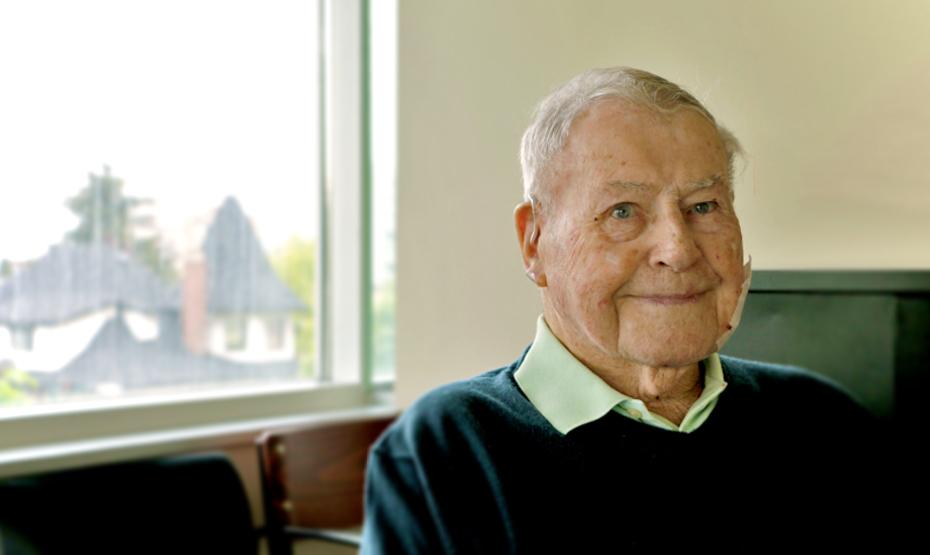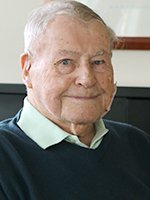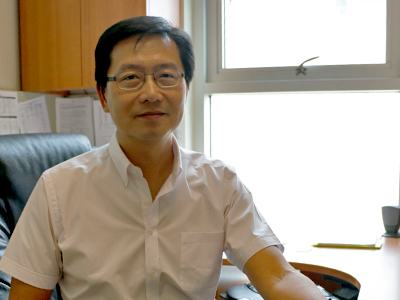
"At 91, I’m happy that this is something I can do to help other people. Why not?"
– Robert Scambler, Tsawwassen
Ninety-one-year-old Robert Scambler describes himself as a very happy person. He has a good circle of friends, he loves his assisted-care living facility in Tsawwassen and he keeps active. He’s only got one complaint. “My leg problem,” Scamber sighs, in his still-strong Scottish accent. “If I didn’t have this leg problem I’d be out playing golf right now!” The Edinburgh-born Scambler’s leg problems are more than an inconvenience. They could have resulted in amputation.
Scambler has critical limb ischemia (CLI)—a result of blocked arteries from plaque build-up. With CLI, blood can’t flow to the extremities of the body. This can cause foot and leg pain, as well as ulcers—both of which Scambler has had. In severe cases, it can lead to gangrene and amputation—which Scambler was facing this past fall.
Scambler considers himself lucky. He’s participating in a comprehensive comparison study of the two main CLI treatment options. The treatments are open surgery to bypass the affected artery, and endovascular treatment (also known as angioplasty)—a less invasive procedure that involves placing a mesh stent or balloon to expand the artery and improve blood flow.

Dr. Jerry Chen, a VCHRI research scientist, and Head of Vascular Surgery at VGH, is leading the study in Vancouver, one of multiple sites across North America. “We want to compare these two treatments for CLI because we actually don’t know which one is better in the long term. Because endovascular treatment is less invasive, initially you might say well of course do the least invasive. But we find that the less invasive approach can be less durable. So the blockage comes back over time.”
In the study, patients like Robert Scambler are randomly assigned either endovascular treatment or bypass surgery. They are then followed for three and a half years to see how each treatment fares over time. Scambler received endovascular treatment that helped him avoid limb loss as well as lessen his other symptoms.
Scambler says participating in the study has been easy and it makes him feel useful. “Being able to do this study makes me feel really good. I like helping people and if my participation means treatment will be better for others down the road then that’s great.”
There’s not a lot of time commitment for Scambler. Following his post-op visits he comes in every 6 months for a check-up and an ultrasound. “It’s not a lot of work for me but of course I couldn’t do it without my Florence Nightingale.”
Scambler is referring to his friend Karen Burden, who drives him to his appointments and sits in on his meetings to make sure he hears all the directives. She calls him Bert and he calls her Birdie. They love to joke back and forth. When Scambler says choosing to be happy is the secret to a long life, Burden quickly adds “or it might be his brandy!”
Burden and Scambler met when they both worked at a friend’s bar after Scambler’s retirement from CP Airlines. Now Burden looks out for him and tries to keep him on track with his post-op instructions. Although his recent procedure has opened up his arteries, Scambler sometimes neglects to follow the guidelines and elevate his legs at night. That’s why he still feels some leg pain. “I sometimes forget,” he says sheepishly. Burden rolls her eyes and vows to stay on his case.
Dr. Chen says advances in treatment and research don’t happen without patients’ help. “We are so grateful to patients like Mr. Scambler who have volunteered their time. We are looking closely at his results and hope to gather information from more patients like him in order to make a conclusion within a couple of years.” The study will also determine which treatment is the most cost-effective.

As for advice on prevention? “Don’t smoke!” says Dr. Chen without hesitation. “And cut sugars. Smoking and diabetes are major contributors to peripheral arterial disease and CLI. Leading a healthy lifestyle can mean you don’t have to face this disease and all its complications later in life.”
The CLI study is still actively recruiting. Dr. Chen says it has been a slow process. “Recruitment has been challenging. We still need more patients taking part. We need health care professionals to be advocates for study participation, even if they might have a bias towards one treatment option—we need to determine the best course and suspend our biases to test it out.”
Dr. Chen encourages anyone who meets the criteria to find out more on the VCHRI Participate in Research website. Scambler also encourages other patients to participate. “Why not? It helps other people and you get excellent treatment.”
As his advocate, Burden agrees. “I think being in this study helped Bert get the help he needed. Through the study, he has been referred to an excellent podiatrist, and now his foot issues are also almost gone.”
THIS IS ONE PATIENT’S STORY OF PARTICIPATING IN A CLINICAL TRIAL. YOUR EXPERIENCE MAY DIFFER. LEARN MORE ABOUT CLINICAL TRIALS BEFORE PARTICIPATING.


